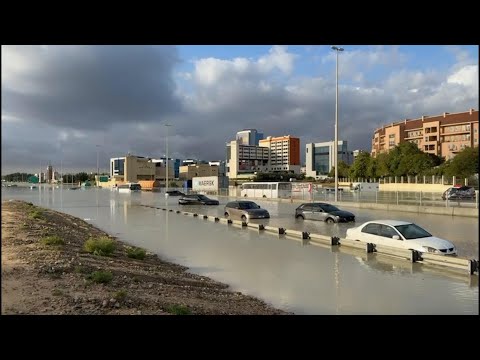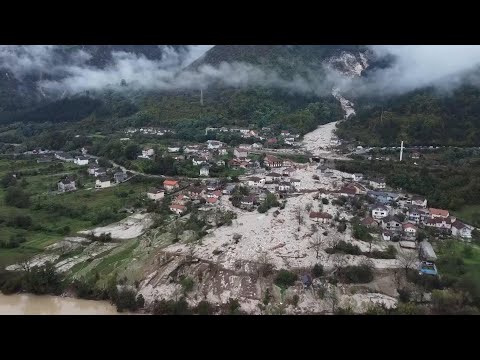(17 Apr 2024)
RESTRICTION SUMMARY:
ASSOCIATED PRESS
Dubai, UAE – 17 April 2024
1. Various of vehicles in flooded streets
2. Water tanker driving into water puddle
3. Various of workers removing tree branches from trees that have fallen from storm
STORYLINE:
The desert nation of the United Arab Emirates attempted to dry out Wednesday from the heaviest rain ever recorded there after a deluge flooded out Dubai International Airport, disrupting travel through the world’s busiest airfield for international travel.
The state-run WAM news agency called the rain Tuesday “a historic weather event” that surpassed “anything documented since the start of data collection in 1949.” That’s before the discovery of crude oil in this energy-rich nation then part of a British protectorate known as the Trucial States.
The storm, which moved through the wider desert region of the Arabian Peninsula, may have been further accelerated by “cloud seeding” flights conducted by the country.
The rains began late Monday, soaking the sands and roadways of Dubai with some 20 millimeters (0.79 inches) of rain, according to meteorological data collected at Dubai International Airport. The storms intensified around 9 a.m. local Tuesday and continued throughout the day, dumping more rain and hail onto the overwhelmed city.
By the end of Tuesday, more than 142 millimeters (5.59 inches) of rainfall had soaked Dubai over 24 hours. An average year sees 94.7 millimeters (3.73 inches) of rain at Dubai International Airport, a hub for the long-haul carrier Emirates.
At the airport, standing water lapped on taxiways as aircraft landed.
The airport ended up halting arrivals Tuesday night and passengers struggled to reach terminals through the floodwater covering surrounding roads.
Dubai International Airport acknowledged Wednesday morning that the flooding had left “limited transportation options” and affected flights as aircraft crews couldn’t reach the airfield.
Schools across the UAE, a federation of seven sheikhdoms, largely shut ahead of the storm and government employees were largely working remotely if able.
Many workers stayed home as well, though some ventured out, with the unfortunate stalling out their vehicles in deeper-than-expected water covering some roads.
Authorities sent tanker trucks out into the streets and highways to pump away the water. Water poured into some homes, forcing people to bail out their houses.
The country’s hereditary rulers offered no overall damage information or injury information for the nation, as some slept into their flooded vehicles Tuesday night. In Ras al-Khaimah, the country’s northernmost emirate, police said one 70-year-old man died when his vehicle was swept away by floodwater.
Fujairah, an emirate on the UAE’s eastern coast, saw the heaviest rainfall Tuesday with 145 millimeters (5.7 inches) falling there.
Rain is unusual in the UAE, an arid, Arabian Peninsula nation, but occurs periodically during the cooler winter months. Many roads and other areas lack drainage given the lack of regular rainfall, causing flooding.
===========================================================
Clients are reminded to adhere to all listed restrictions and to check the terms of their licence agreements. For further assistance, please contact the AP Archive on: Tel +44(0)2074827482 Email: info@aparchive.com.
Find out more about AP Archive: http://www.aparchive.com/HowWeWork
Twitter: https://twitter.com/AP_Archive
Facebook: https://www.facebook.com/APArchives
Instagram: https://www.instagram.com/APNews/
You can license this story through AP Archive: http://www.aparchive.com/metadata/youtube/8ddd0b0ab666499992607e051ff91886





